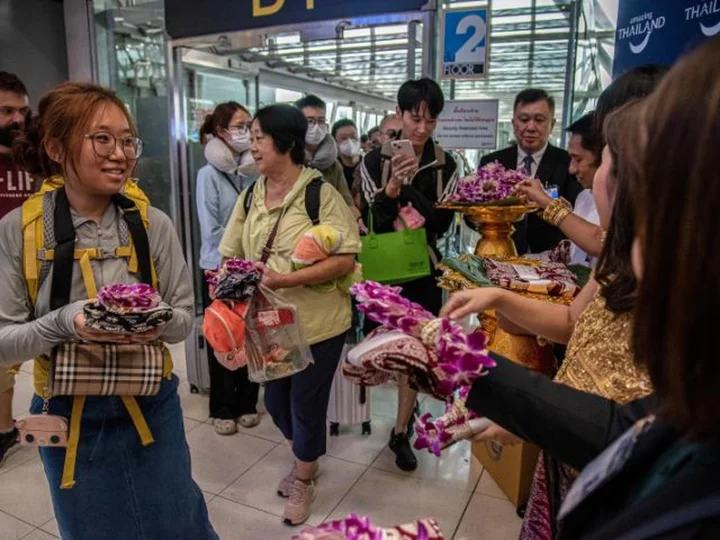Thailand's golden beaches, shopping districts and ornate temples are filling with tourists once again and Chinese vacationers are getting an especially VIP welcome under a new visa-free scheme.
Vowing to revive the country's economy, newly appointed Prime Minister Srettha Thavisin announced a visa-free policy for Chinese and Kazakh tourists that would run from September 25 to February 24 next year, signaling that the recovery of Thailand's tourism industry is a top priority.
The policy came just in time for China's "Golden Week" holiday period, which is centered around National Day on October 1.
This year's Golden Week coincides with the Mid-Autumn Festival, marking a 10-day travel rush spanning September 29 to October 8. It's also one of the first holiday periods since the Covid-19 pandemic during which people from China can travel without restrictions.
Chinese visitors arriving from Shanghai were greeted with gifts, handed out by Sretta and tourism ministers, at Bangkok's airport on Monday as the visa-free policy took effect.
"We are confident that this scheme will boost the economy substantially," Sretta told reporters.
"We would like to encourage more visits from Chinese tourists not only at major cities like Chiang Mai, Bangkok, Pattaya and Phuket."
He noted that the Thai government hopes to see travelers visit more smaller towns, to lengthen their stay and increase spending.
This week's warm welcome was appreciated by Beijing, China's Foreign Minister Wang Wenbin said in a press conference on Tuesday.
China was once the largest source of tourists to Thailand, with almost 11 million visitors heading to the Southeast Asia nation in 2019, accounting for more than a fourth of international arrivals before the Covid-19 pandemic plummeted the global tourist market.
Those numbers are a stark contrast to 2023. Only 2.2 million Chinese travelers arrived between January and September 10 this year, according to data from the Tourism Authority of Thailand.
Southeast Asian countries had set high hopes for a rebound of international travel to boost their tourism sectors following the pandemic shutdowns, their positive forecasts bolstered by China's easing of travel restrictions in early 2023.
But with a sluggish Chinese economy, a weaker yuan and grim unemployment figures, regional travel hubs had to pare down their expectations and brace for a longer road to recovery.
Gary Bowerman, founder of Check-in Asia, a tourism-focused research and marketing company, said the new visa-exemption strategy sets the tone not just for the Golden Week peak seasons but also upcoming Christmas and Lunar New Year holiday periods.
"Competition is really intensifying in the region to attract Chinese tourists amongst all countries, and you have to make it as easy as possible," said Bowerman.
He added that the Chinese outbound travel industry is going through a "transitory period," as travel trends and sentiments have changed since the pandemic, while more Chinese consumers are also looking for different experiences -- often on smaller budgets.
Traveling by the millions
Last year, China wasn't letting citizens travel outside the country for leisure because of its Covid restrictions. That sparked a domestic tourism boom.
Now, though the economy is struggling, people who can afford to travel are increasingly taking the opportunity to go abroad for a brief escape.
Among these is a tech worker surnamed Huang. On Xiaohonshu, China's equivalent of Instagram, she told CNN that she spent the long October holiday on a road trip to the western part of Sichuan province last year but this time around she's flying over to Thailand to go on a surfing adventure.
"I've been there before. What I want to see and experience most is surfing. I still have no idea about how the waves are like in Thailand, and I'll be exploring some new destinations this time," she said.
Outbound international travel bookings are nearly 20 times higher compared to the same holiday period last year, according to Trip.com, which also operates China's largest travel booking platform, Ctrip.
In September 2022, for example, more than 70 major Chinese cities were under coronavirus lockdowns, impacting some 300 million people.
After the visa-free scheme was revealed on September 13, hotel bookings to Thailand surged 6,220% compared with the same period last year, Trip.com said. Thailand is projected to be the top tourist destination for outbound Chinese travelers, with South Korea, Malaysia, Singapore, Australia and the United Kingdom trailing close behind.
More than 21 million passengers will travel by air in China during the Golden Week period, with an average of 17,000 daily outbound international flights and another 14,000 domestic flights per day, said Jin Junhao, a deputy director at the Civil Aviation Administration of China, in a press conference.
Trains are also busier than ever, taking people domestically to China's many far-flung destinations.
China Railway estimates around 190 million railway trips will be made during the 12-day travel rush from September 27 to October 8, according to rail booking platform 12306.
That's more than double the 72 million trips made during the same holiday last year and even exceeds the 138 million trips made in 2019, before the pandemic.
Despite the surge in numbers, China's outbound international flight capacity is still down around 50%, much lower than other countries, and international flight fares are still much higher compared to 2019 due to the limited capacity available, said Joanna Lu, head of consultancy for Asia at Ascend by Cirium.
Meanwhile, traveler habits have altered since the pandemic. The Chinese travelers who are venturing out of the country these days want new experiences at a reasonable price, said Dr. Wolfgang Georg Arlt, CEO of the China Outbound Tourism Research Institute (COTRI)
"There's been a change in that people are looking for value for money," he said.
Those with spending power will continue to travel around not just for leisure but they also want to squeeze in business, health, education and family time on those trips, he adds.
Rumors, film complicate efforts to lure back tourists
Prior to the announcement of the visa-free policy this month, Chinese tourists had been slow to return to Thailand.
During the first seven months of 2023, China was absent from the list of Thailand's top source markets for tourists for the first time in a decade, according to data from Thailand's Ministry of Tourism and Sports released in August.
Complicating efforts to win back this lucrative market, social media users in China reportedly expressed fears of visiting Thailand, because of rumors that claimed travelers could be kidnapped and sent across the border to work in scam centers in Myanmar or Cambodia. Those accusations were further inflamed with the release of the film "No More Bets," a thriller set in an unnamed Southeast Asian country where people are lured to work in scam factories.
Meanwhile, a hashtag that translates to "why people are unwilling to travel to Thailand" earned 420 million views on Weibo and was a top discussion topic on the social media site last month, with some users saying they were afraid of being lured into scam factories, while others cited that the visa process at that time took too long.
That propelled the government to try and rebuild the confidence of Chinese consumers, said Sisdivachr Cheewarattanaporn, president of the Thai Travel Agents Association. He added that the rumors were untrue and those illicit operations were happening in neighboring countries like Myanmar and Cambodia, not Thailand.
Whatever the reason for the lackluster arrival numbers earlier this year, Thailand's tourism industry is still betting on a boom as Chinese travelers hit the road for the upcoming holiday periods.
"It may not be up to 100% yet but it is getting better. Tour companies have got themselves ready," said Sisdivachr.









